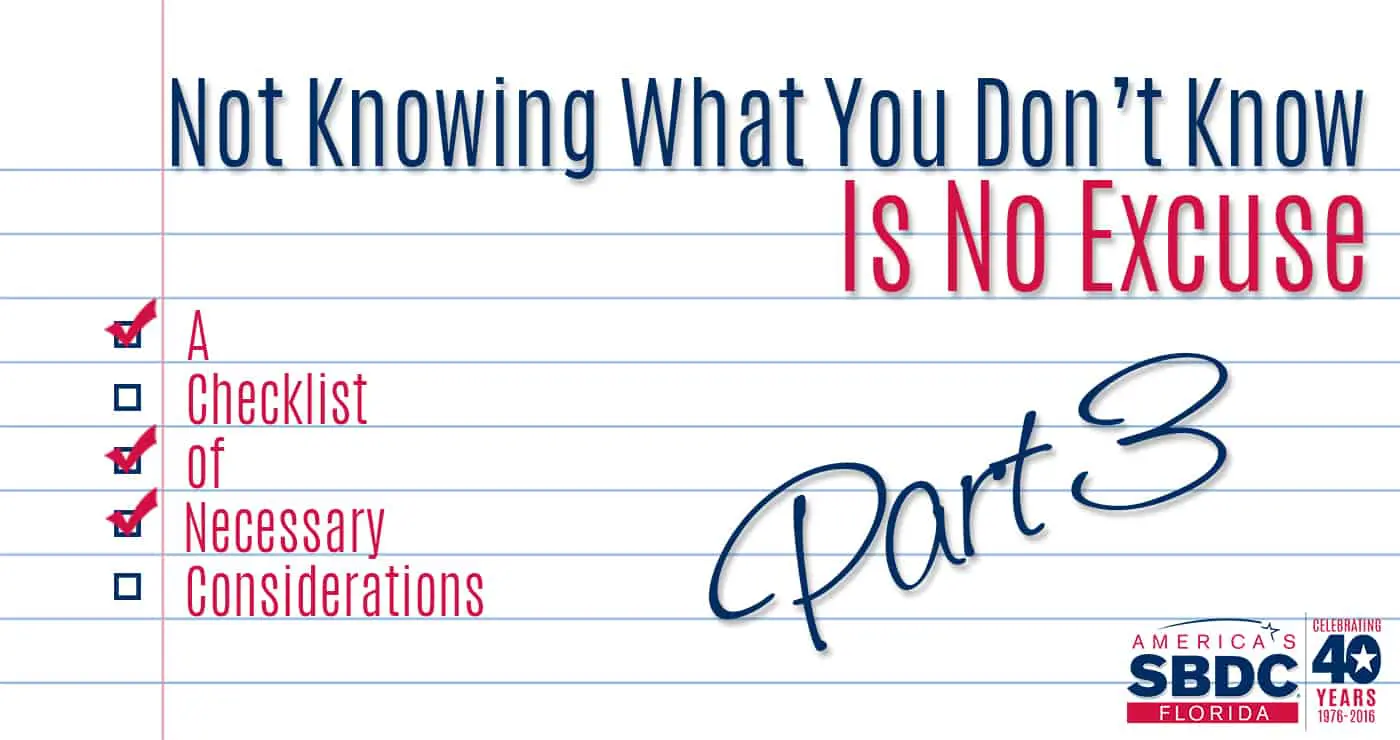Part 3: Not Knowing What You Don’t Know Is No Excuse
These Administrative Foundations Could Be Extra Insurance for Long-term Business Success
Many would-be business owners are so excited to be “starting a business” that they hastily “get married to” the idea of how much fun and freedom they will have. In addition, many hop into what they think will be a “fun time” to grow a company with a relative, friend or business colleague that they may have worked with in the past, or perhaps, to the contrary, someone who seems exciting and could be their “professional complement.”
The following represents the last of a three-part checklist of necessary considerations – taken from a small business case study – meant to serve as health prevention for a business. In this case, one of the entrepreneurs had little business knowledge of shareholder relationships and disastrous consequences of 50/50 ownership. Disregarding any of these could be very costly.
(Disclaimer: This is not meant to be an exhaustive list. Please consult a lawyer and CPA or for specific assistance.)
Lesson #7
Put everything in writing. This is a simple lesson. It relates to by-laws, financial agreements, purchase agreements, agreements between two companies, forecasting discussions, scheduled meetings between owners, etc., basically anything that happens with the business. This serves as a chronology and historical documentation. After a few months, details can fade away in the minds of the best of us. Lawyers will tell you, “If it’s not in writing, it didn’t happen.” By the same token, each party must read everything carefully that requires a signature. Make certain that the intended meaning of the verbiage or document is the actual meaning and any confusing language is revised before finalization. Again, each involved party should have their own attorney review the document for any binding implications or to clarify any unclear statements.
Lesson #8
Review corporate books and records often and sign them. Major legal problems in corporations/limited liability corporations can occur if the books and records are not kept up to date in the manner outlined in the by-laws, member or operating agreement of the company. Has your company mandated to have an annual meeting? Have the shareholders and members been properly notified? Are the minutes reflective, in a timely manner of that meeting, who attended and the business that was transacted? Were any changes made to the original documents? By-laws, partnership, operating and member agreements are not just paperwork you have to have for the State of Florida. They are a living, breathing part of your corporation. Keeping them up to date could be the difference between having a business one day and not having it the next.
Lesson #9
Failing to plan = Planning to fail. Businessowners can feel intimidated by the term business plan or marketing plan. Often, these become thoughts of onerous documents, both requiring reams of paper and everything to be completely thought through, ready for perfect execution. In fact, business plans, just like their little sister, marketing plans, are outlines of the owner(s) expectations and projections and goals, both in actions and budget. Both can (and should) be updated following evaluation or better opportunity for return on investment. In addition, the plans should go another step to identify who is responsible for the execution of an action or strategy. Having this in place, it will help prevent any misunderstandings and last minute confusion.
Lesson #10
Don’t assume this won’t happen to you. When in doubt, reread the other nine lessons.






Karen E. Krymski
Consultants, Government Contracting Consultants, Krymski, TampaFlorida PTAC at USF, Tampa
Specialty: Procurement, Marketing
Karen Krymski has more than 20 years of experience as an entrepreneur, owning a firm that specialized in marketing, business development, public affairs, organizational leadership and strategic planning. Clients ranged from start-up small businesses to Fortune 500 companies (gold emblem brands). Her company was retained to assist in achieving clients’ strategic direction, branding and revenue goals and most retained her firm for successful execution following the planning process. Krymski’s industry knowledge spans a broad range and includes medical (behavioral health, physician practices and home healthcare) and dental; utilities (water, wastewater, solid waste and recycling); and retail promotions. She built a successful federal government business pipeline for a women-owned IT security company and also founded a local chapter of a national women’s business organization, achieving 350 invested members within a four year period. She earned a bachelor’s in health education and a master’s in public health planning from the University of Pittsburgh and completed a hospital administrative residency in Fort Myers. In 2007, she was honored as the Managing Director of the Year by eWomenNetwork, was a finalist in 2008 for the Tampa Bay Business Journal’s Businesswoman of the Year and was awarded the Iconic Woman award in 2012 from the St. Petersburg Chamber of Commerce.